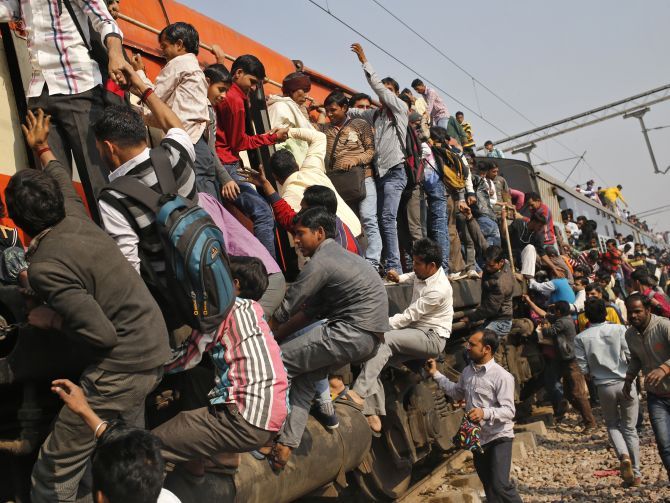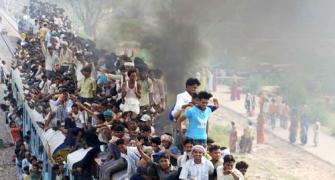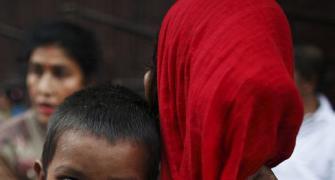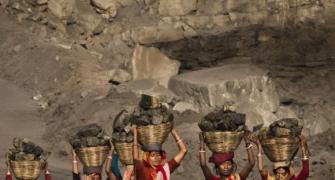Will Prime Minister Modi start a conversation on the need for people to limit the size of their families, asks Colonel Anil A Athale (retd) on the occasion of World Population Day, July 11.

'I would take you to the house of Kalawati, a woman with nine children whose husband committed suicide. I would urge you to respect her.'
Then Congress general secretary Rahul Gandhi quoted her example in his July 21, 2008 Lok Sabha speech, while talking about farmers's suicides and the rural struggle. But he refrained from making any comment on the nine children in the family that could well have been the 'real' reason for the economic distress.
Today, if we look at the demographic picture of South Asia and plot per woman fertility of 4 to 5 among the poor, we will find that Pakistan, Uttar Pradesh, Bihar, Kashmir and Bengal fall in this belt.
Just using the single criterion of woman fertility and family size, we come to the conclusion that these are the very areas that are prone to violence, see large scale migration (internal in case of India and to the West in case of Pakistan).
Indian hypocrisy on the population problem is breathtaking -- we fail to accept the basic fact that poverty in India refuses to go away because the poor are growing at double or triple the rate as compared to the rest of society.
Demographic data carefully hides the fact that while the middle class has reached zero or negative rate of growth of population, the poor continue to breed at breakneck speed.
At the root of environmental degradation, rising social inequality and violence is the simple and straightforward fact of unsustainable fertility levels.
Even a layman would understand that with zero or negative rate of growth in the middle class, there is accumulation of wealth while in poorer segment with five or more children, there is increased deprivation from generation to generation.
Ever since the 1977 post Emergency defeat of Indira Gandhi's Congress, at the political level there has been a conspiracy of silence on the vital issue of control of runaway population growth. On this, all parties from the Bharatiya Janata Party to the Congress are united.
While public intellectuals propagated a myth of fight against the Emergency as a fight for freedoms, the politicians with their ear to the ground know well that it was nasbandi (forced vasectomy) and coercion on family planning that did in the Congress and the mighty Indira Gandhi.
The setback to family planning of that era has come to haunt the country where none is prepared to touch the issue of reasonable fertility curbs. One need not emulate China and its 'one-child' norm, but surely two or three children per family norm needs to be promoted.
The swelling ranks of uneducated and unskilled also means a double whammy as the labour market is flooded and wages are driven down. A large family size also means that besides a strain on family resources, nurturing of a large brood of children becomes a problem.
Within India itself one sees the effect of this so vividly. An unskilled worker in the south or the west earns at least three times more than in the populous north.
Along with environment and climate change, this is an issue that needs global action. The UN has many programmes for population stabilisation. The time has come for the world body to fix a reasonable population growth model and ask countries to act.
Earth has finite resources and if we are to survive, then a curb on numbers is a must. The UN could/should nudge the countries towards enacting suitable incentives/disincentives on the lines of mandatory regulations.
In extreme case, there is a need to then establish a worldwide quarantine or trade and travel curbs on countries that refuse to co-operate.
At the national level, like Swachh Bharat or building of toilets, we must start a conversation on limiting family size to two or three children.
After a suitable warning period, the government should limit the various welfare schemes like free housing, cooking gas or free electricity to people who follow a small family norm.
'Demography is destiny'. Like geography, it influences politics, economics and issues of war and peace.
Though demography (population numbers, composition and density) is not permanent and certainly changes, yet the rate of change is very slow and there is certain inevitability about its effect.
Pakistan is a classic case where the demography of the country in combination with its geography makes a combustible mixture that has the potential to blow up the region in the mid-term.
Historically, Europe also saw this kind of population growth in the 16th and 17th century. But those were the days of fluid national boundaries and colonialism.
The European hordes decimated the populations of America and Australia and usurped the resources of Africa to get over this crisis. This luxury is not available in the 21st century.
Prime Minister Narendra Damodardas Modi has shown in the past that he is not afraid of bold -- but not necessarily popular -- initiatives.
While regional or global issues are beyond India's control, as a first step, will Prime Minister Modi bell the cat and start a conversation with his monthly Mann Ki Baat programme on the need for people to limit the size of their families as a first step to reducing poverty?










